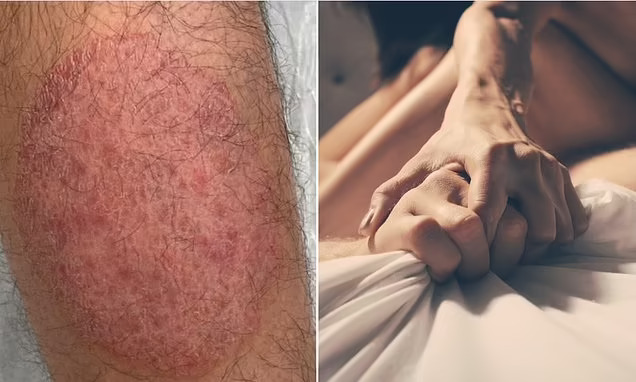Medical experts are sounding the alarm on a highly contagious rare fungal strain following the first reported case of a sexually transmitted ringworm in the United States.
Dr. Avrom Caplan, lead author of the study and a dermatologist at New York University Grossman School of Medicine, emphasized the significance of the emergence of Trichophyton mentagrophytes type VII, the latest addition to a group of severe skin infections in the country.
Trichophyton mentagrophytes type VII, identified as a sexually transmitted fungus by the Centers for Disease Control, has raised concerns after a recent case involving a man in his 30s from New York City. The man, who reported engaging in sexual activities with men during trips to California, England, and Greece, developed ringworm on his genitals, buttocks, and limbs upon returning home.
This drug-resistant fungus, capable of causing skin disease in both animals and humans, is acquired through sexual contact. The CDC has documented cases worldwide, particularly among men who have sex with men and travelers returning from Southeast Asia.
Dr. Caplan highlighted that the rash associated with this infection may resemble eczema rather than the typical circular pattern seen in ringworm infections. While not fatal, the infection can result in permanent scarring.
Interestingly, Dr. Caplan and his team at NYU Langone Health had previously identified cases of a different ringworm infection caused by Trichophyton indotineae, which are contagious but not sexually transmitted. These cases, along with the emergence of Trichophyton mentagrophytes type VII, underscore the need for vigilance in monitoring and treating fungal infections.
The report also raises concerns about the increasing prevalence of drug-resistant fungal strains, such as Trichophyton indotineae, which have shown resistance to standard therapies. This poses a significant public health threat as these infections may be unresponsive to first-line antifungal treatments like terbinafine.
Symptoms of Trichophyton mentagrophytes type VII include intense itching, inflamed circular patterns on the skin, hair and nail issues, and the potential to cause athlete’s foot. This underscores the importance of early detection and appropriate management to prevent further spread of the infection.











More Stories
Protecting Wealth in Uncertain Times: Defensive Diversification Approaches
Fake news sites outnumber US newspaper sites: Report
This is how US Fed rate cuts will impact Indian economy